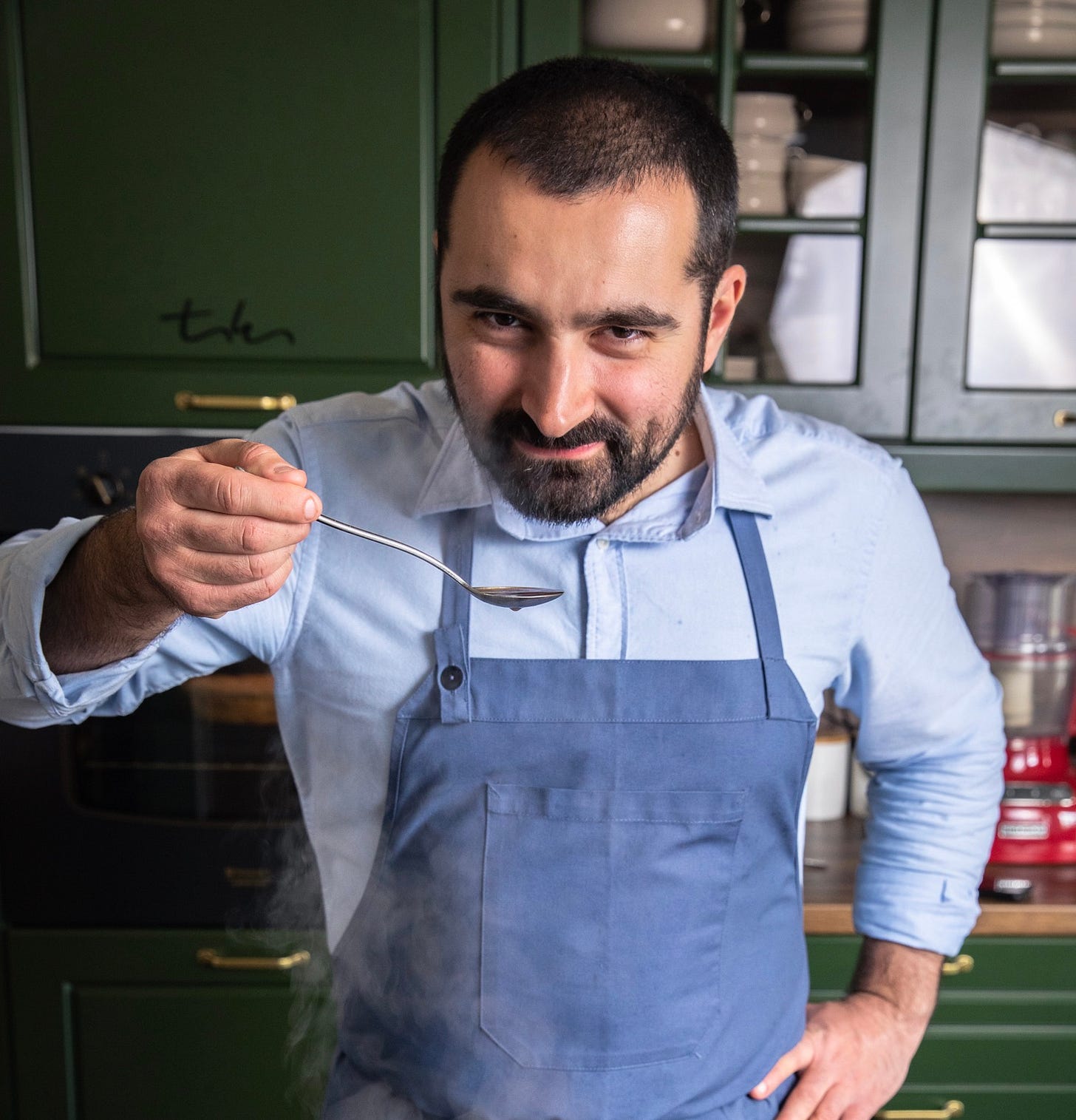TENTEN: Feasting with Fejsal
Fejsal Demiraj was a sous chef in noma, world's best restaurant. He's recently published a book on traditional food from Kosovo. Oh, he also an affable author of his own awesome ajvar brand.
Noma is the three-Michelin star restaurant that has famously transformed Copenhagen and Danmark into global gastronomic epicenters . It was selected as world’s best restaurant a record five times and one of most influential places in the world by the Time magazine in 2018. Rene Rexhepi, the Albanian-Danish chef became a global figure too, with his own TV show on Amazon and bestselling books.
But few people know that his second-in-command, the sous-chef of noma, was another Albanian chef Fejsal Demiraj, with roots originally from northern Tropoja region of Albania. We last met Fejsal in New York, at the opening of the Petrit Halilaj exhibition “Abetare” in Metropolitan Museum, but we think of him often, every time we spread on bread his own ajvar named Amëz (we buy ours at supermarkets Spar or Conad in Prishtinë), where ‘wood-fire roasted bell peppers and eggplant are peeled, chopped, slow-cooked for hours and finished with a bit of garlic, wild apple vinegar and sea salt.”
Few people have done more to document the food traditions of Albania and Kosova then Fejsal. Though he’s a globe-trotting chef with intimate knowledge of world cuisine, who specialized in making the famous noma dishes like “light jelly of reindeer brain” or “beetle made from berry hides and black garlic” or “duck feet candies”, Fejsal’s love for the archaic food recipes, especially in hinterlands of Dukagjin and northern Albania, makes him an incredible source of inspiration, also in our own neck of the woods. Fejsal has been credited by The Guardian of leading the “Albanian food revival” and more recently, together with Jeton Jagxhiu, Fejsal has authored a beautiful book titled “Tastes of Dukagjin” dedicated to the archaic traditions of food of western Kosovë. (buy it here!)
As autumn is the season for ajvar (and pickles!), we just had to have this TENTEN interview with Fejsal Demiraj.
If Copenhagen, Prishtina, and New York were ingredients, what would they be?
Copenhagen - wild beach rose; Prishtina - “çerep” because Prishtina is rough around the edges, heavy and has always displayed resilience; New York - shellfish found on Long Island. Together this would make a “Broiled Shellfish Tava, perfumed with rose”
You worked at NOMA with Rene Rexhepi, and you guys are known for pushing culinary boundaries. How did your time there influence your approach to using ingredients from Albanian cuisine that many consider "archaic"?
My time at noma made allowed me to find value in the “archaic”. “Flia” can be seen as archaic but when analyzed and broken down as a chef one can synthesize and turn up the volume on every component to create a new type of sound.
You started a business making ajvar. Is your own brand of ajvar ‘Amëz’ result of any such considerations?
Yes! Ajvar can be seen as one of the most “archaic” and typical Ingredients of Balkan cuisine. I hated all the options found at the supermarket so I decided to make the best one on earth, the only one actually made by a chef.
In your book, you explore traditional Albanian ingredients. Have you ever had an ingredient "talk back" to you—something you didn’t expect to be this powerful on the plate?
Maza e Vjeter e Rugovës. It's an undervalued ingredient that speaks to the importance of pastoralism throughout Albanian history. Maza e Vjeter e Rugoves is one of the treasures of Albanian Cuisine and tells our story as a people.
Do you ever feel like a rockstar when plating? Any "guitar solo" dishes?
Never. Humility is what has grounded me and gotten me this far.
Since winter time is approaching, we need to ask you about “turshi” (pickled food)... From noma’s fermentation experiments to Albanian brines and pickles, what’s your take on how different cultures preserve flavor, and where do they surprise you the most?
Pickles and fermentation are probably one of the biggest factors in the preservation of our species. Not only do fermented foods keep our guts healthy, they have steered us on the path of deliciousness for millennia. One of the most surprising was a tërshi made in Tropoja, where my family is from. Peppers are salted and sealed with milk. Over time they all ferment together and the milk turns into yogurt while the peppers stay crunchy. Amazing
Which three personalities you would like to have around your dinner table from global or local landscape of culture, music, politics – dead or living people?
Socrates, Leonardo da Vinci, Skenderbeg
If Albanian cuisine were a film, and you are the director, what genre would it be? Traditional or modern dishes in the lead?
It would be a documentary film. I would want to show what were traditional dishes pre and post Communism in Albania, it is something we need to know. Traditional all the way.
If you could create a dinner playlist, mixing sounds from your kitchen experiences in Copenhagen, Prishtina, Paris and New York, what tracks or genres would make the cut?
Enter Sandman - Metallica / Gang Starr - Moment of truth / La Foule - Edit Piaf / Mama Said Knock You out - LL Cool J / Baresha - Nexhmije Pagarusha / Don't sweat the technique - Rakim / Hotter than hell - Dua Lipa / You wanted a hit - LCD Soundsystem
Let's get back to ajvar. Do you like it hot or mild? And give us a simple recipe for a sandwich with your Amëz ajvar?
Ajvar I like very hot! Especially the one we make with Somborka peppers, which no other producer does.
My go to sandwich is something like a BEC (Bacon Egg and Cheese) but this is called AEC (Ajvar Egg and Cheese). Take a good roll, or somun, or English muffin, toast with butter and spread Ajvar on both sides. Meanwhile make fluffy scrambled eggs and melt cheese on top. Put into the roll and forget all of your problems.






